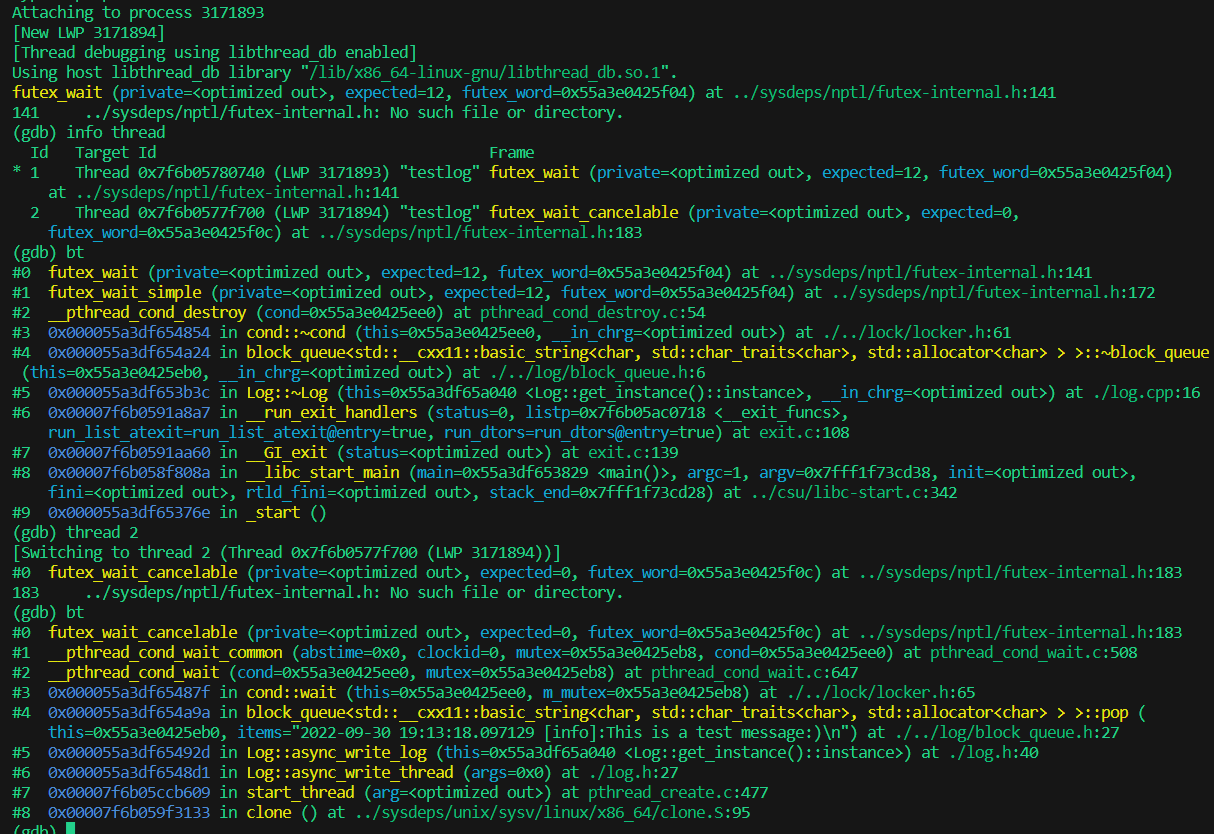V2EX › C++
WebServer 异步日志模块, Log 类构析导致线程死锁, 不知如何解除异步线程阻塞
tracker647 · 2022-09-30 20:07:52 +08:00 · 1395 次点击这是一个创建于 840 天前的主题,其中的信息可能已经有所发展或是发生改变。
测试异步日志发现程序一直卡着,调了半天才发现感觉可能是线程死锁了,gdb 查了两个线程 bt 果然是,主线程调用delete m_queue时要构析条件变量, 然而另一个线程已经用条件变量 wait 拿到互斥锁阻塞自己没法退出,导致主线程得一直等待。
把~Log 的delete m_queue一行删除就解决了,但想尝试做到既能内存 0 泄露又能正常退出程序, 问题是不知道怎么解决工作线程的 wait 状态。
一开始以为在~block_queue 部分加入m_cond.broadcast()就能解除工作线程 wait 状态了,毕竟是主程序调用的~block_queue, 然而不知道为何仍旧死锁。
热心的群友们有何良方吗?
log.h
#ifndef LOG_H
#define LOG_H
#include<iostream>
#include<string>
#include<cstring>
#include<stdarg.h>
#include<time.h>
#include<sys/time.h>
#include<queue>
#include<assert.h>
#include "../lock/locker.h"
#include "../log/block_queue.h"
using namespace std;
class Log{
public:
Log();
~Log();
void init(const char *file_path, int log_buf_size = 8192, int max_line = 80000, int queue_size = 800);
static Log* get_instance(){
static Log instance;
return &instance;
}
static void* async_write_thread(void *args){
Log::get_instance()->async_write_log();
return 0;
};
void write_log(int level, const char *format,...);
void flush() {
m_mutex.lock();
fflush(m_fp);
m_mutex.unlock();
};
private:
char *get_current_time(char *time_buf, const char *format);
void async_write_log(){
string logstr;
while(m_is_async && m_block_queue->pop(logstr)){
m_mutex.lock();
if(DEBUG) printf("log puts\n");
fputs(logstr.c_str(),m_fp);
m_mutex.unlock();
}
if(DEBUG) printf("thread end\n");
};
private:
char m_log_dir[128]; //日志存放目录
char m_log_name[128]; //日志名
FILE *m_fp;
bool m_is_async; //异步日志模式,控制异步线程
int m_today;
int m_max_line;
int m_line_cnt;
int m_wlog_buf_size;
char *m_wlog_buf;
locker m_mutex;
block_queue<string> *m_block_queue;
};
#define LOG_DEBUG(format, ...) {Log::get_instance()->write_log(0,format,##__VA_ARGS__); Log::get_instance()->flush();}
#define LOG_INFO(format,...) {Log::get_instance()->write_log(1,format,##__VA_ARGS__); Log::get_instance()->flush();}
#define LOG_WARN(format, ...) {Log::get_instance()->write_log(2,format,##__VA_ARGS__); Log::get_instance()->flush();}
#define LOG_ERROR(format, ...) {Log::get_instance()->write_log(3,format,##__VA_ARGS__); Log::get_instance()->flush();}
#endif //LOG_H
locker.h
#ifndef LOCKER_H
#define LOCKER_H
#include<exception>
#include<pthread.h>
#include<semaphore.h>
class sem{
public:
sem(){
if(sem_init(&m_sem, 0, 0) != 0){
throw std::exception();
}
}
bool wait(){
return sem_wait(&m_sem) == 0;
}
bool post(){
return sem_post(&m_sem) == 0;
}
~sem(){
sem_destroy(&m_sem);
}
private:
sem_t m_sem;
};
class locker{
public:
locker(){
if(0 != pthread_mutex_init(&m_mutex, NULL)){
throw std::exception();
}
}
pthread_mutex_t *get(){
return &m_mutex;
}
bool lock(){
return pthread_mutex_lock(&m_mutex) == 0;
}
bool unlock(){
return pthread_mutex_unlock(&m_mutex) == 0;
}
~locker(){
pthread_mutex_destroy(&m_mutex);
}
private:
pthread_mutex_t m_mutex;
};
class cond{
public:
cond(){
if(0 != pthread_cond_init(&m_cond,NULL)){
throw std::exception();
}
}
~cond(){
pthread_cond_destroy(&m_cond);
}
bool wait(pthread_mutex_t *m_mutex){
int ret = pthread_cond_wait(&m_cond,m_mutex);
return ret == 0;
}
bool signal(){
int ret = pthread_cond_signal(&m_cond);
return ret == 0;
}
bool broadcast(){
int ret = pthread_cond_broadcast(&m_cond);
return ret == 0;
}
private:
pthread_cond_t m_cond;
};
#endif
block_queue.h
#ifndef BLOCK_QUEUE
#define BLOCK_QUEUE
#include<queue>
#include "../lock/locker.h"
template <typename T>
class block_queue{
public:
block_queue(int sz):m_maxsize(sz){}
//往阻塞队列加入日志 string
bool push(const T &items){
m_mutex.lock();
//如果队列已满,需通知消费者
if(m_queue.size() >= m_maxsize){
m_cond.broadcast();
m_mutex.unlock();
return false;
}
m_queue.push(items);
m_cond.broadcast();
m_mutex.unlock();
return true;
}
bool pop(T &items){
m_mutex.lock();
//若队列为空,需等待条件变量
while(m_queue.size() <= 0){
if(!m_cond.wait(m_mutex.get())){
m_mutex.unlock();
return false;
}
}
items = m_queue.front();
m_queue.pop();
m_mutex.unlock();
return true;
}
bool full(){
m_mutex.lock();
if (m_queue.size() >= m_maxsize){
m_mutex.unlock();
return true;
}
m_mutex.unlock();
return false;
}
bool empty(){
m_mutex.lock();
if(m_queue.size() == 0){
m_mutex.unlock();
return true;
}
m_mutex.unlock();
return false;
}
~block_queue(){
m_cond.broadcast();
}
private:
int m_maxsize;
locker m_mutex;
cond m_cond;
std::queue<T> m_queue;
};
#endif
testlog.cpp
#include"log.h"
#include<unistd.h>
int main(){
Log::get_instance()->init("testfile");
LOG_INFO("This is a test message:)");
sleep(3);
const char *mes = "log ends";
write(1,mes,strlen(mes));
printf("log ends\n");
return 0;
}
现象:

1
tracker647 OP 一番研究后找到一个解决思路, 首先日志类已经设了一个`m_is_async`的 bool 变量用于打破工作线程的循环,而 pop 条件变量的解锁条件是阻塞队列内有 push 东西经历,于是在`~Log`放了一行操作让`m_queue`push 东西打破工作线程的阻塞状态退出,工作线程再次 while 检查就会发现`m_is_async`已经被设为 false 了,从而正常退出。
``` //Log 类 Log::Log(){ m_line_cnt = 0; m_is_async = true; memset(m_log_dir,0,sizeof(m_log_dir)); memset(m_log_name,0,sizeof(m_log_name)); } Log::~Log(){ if (m_fp != NULL){ fclose(m_fp); } m_is_async = false; delete[] m_wlog_buf; m_block_queue->push("log end"); //用于结束日志线程的阻塞状态,不加会死锁 delete m_block_queue; } void async_write_log(){ string logstr; while(m_is_async && m_block_queue->pop(logstr)){ m_mutex.lock(); fputs(logstr.c_str(),m_fp); m_mutex.unlock(); } }; ``` |
2
luassuns 2022-10-11 21:57:01 +08:00
@tracker647 应该先 `m_is_async = false;` 再 fclose ,而且应该在置 false 后 join thread 等待线程结束,要不可能会 fputs 到 close 的 handle 里。
|